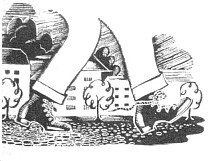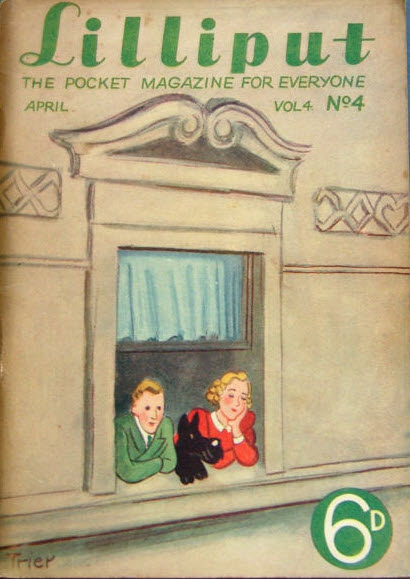DESTINY

By Frederick Karinthy
The Bootlaces
I WOULD just like to tell you what always happens to me with my bootlaces. I know very well that nothing like this ever happens to other people, nice tidy people, but still I want to tell you what happens to me with my bootlaces in the morning.
I buy the bootlaces and wear them in the ordinary way for a week. To lace my boots, I hook the laces over the hooks at the top and tie them into a neat bow.
After about a week, one morning the little metal tip on the laces, which helps to thread them through the holes, breaks off.
I feel annoyed. I say, “I must buy a new pair. Bootlaces are getting rotten nowadays!”
Then I wet the end of the broken lace and twist it between my fingers to make a point. And I push it through the holes.
Next day when I pull the laces, I feel them stretching suspiciously.
“Oh, bother, I must buy new bootlaces to-day!” I say, giving the lace a jerk. Thereupon the end of the lace comes off in my hand.
There is no possibility now of tying the lace into a bow, because one end is three inches shorter than the other. Never mind, I say to myself, I’ll get some new laces to-day, anyway. So I loosen the other end of the lace all the way down and pull it towards the shorter side, so that it becomes longer. But now the shorter end is two inches longer, and so it is still impossible to tie it into a bow.
By now I have spent half an hour with the blasted laces. I call them all sorts of names, and feel an intense hatred towards them. “All right,” I say, “I won’t have a bow to-day! Who cares?” I say it with savage defiance and tie the lace into an angry double knot. That will hold until evening, when I shall have bought new laces.
At night I cannot undo the knot which has grown taut and swollen. I curse loudly, but after some hesitation I put my index finger under the knot and lift the lace, knot and all, off the top hook with a neat and graceful movement. This loosens the whole lace. My
LILLIPUT
being fills with unspeakable joy. It is easy to lift the lace off the other hooks and take off the boot.
Next day, the lace, now a mere loop, hangs in a festoon on my boot. I am daunted. What next?
Suddenly an idea flashes to my brain—if I could lift it off last night, I can lift it back the same way this morning. I hook the loop over the hooks, pull it tight and with a last effort get the ends over the top hook with a sigh of relief. Marvellous! Why don’t they make shoelaces this way to begin with; it is so much easier than to tie them into a bow. I have a vague notion of going to the patent office. Anyway, I shall buy a new pair to-day.
This struggle lasts several days. Every morning, I fight a winning battle with the loop, which in the end always snaps into place over the top hook. But summer turns into autumn, and queer presentiments come over me in bed, whenever I remember the bootlaces. They are looser now, and it needs no effort on my part to snap them
into place over the top hook. Quite the contrary, they now sometimes slip off of their own accord.
This annoys me, and when it happens again, I pull violently in order to make a fresh knot. A sinister snap . . . the lace breaks.
I stare at its wreck with glassy eyes. What am I to do? There is no time to be lost. I begin to work feverishly. I yank out the whole lace. I tear off all knots. All that is left is a stump. My brain functions with lightning rapidity. Only a genius sees and feels so clearly at critical moments. I twist the stump round the three top hooks. I tie the ends in a knot. Anyway, I shall be buying new laces to-day. Until then, this will do.
But one day the tongue of my boot slips out from under the stump of the lace. It happens in the street, and I do not notice it. My boot puts out its tongue with a ribald grin. The tongue catches under my heel. I stumble and fall. I break my neck. And now I shan’t need to buy that new pair of laces.

408
